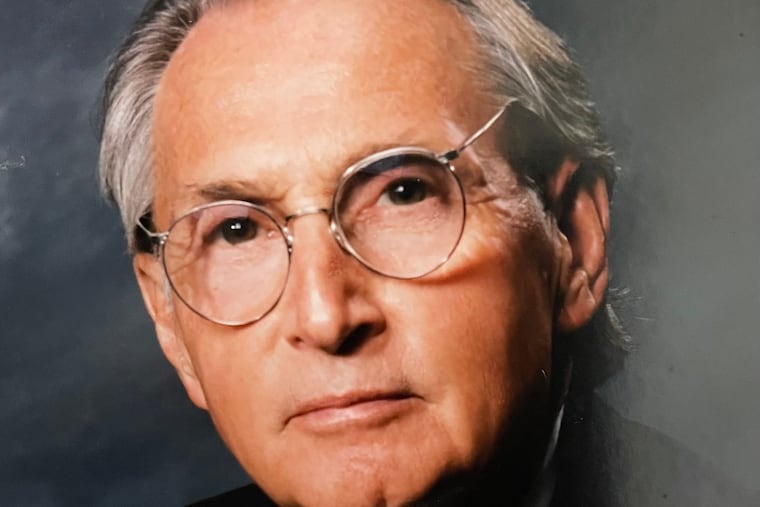Myles Turtz, pioneering children’s physician and hospital executive, has died at 93
Dr. Turtz was a nationally known expert in otolaryngology, the treatment of ear, nose, and throat issues.

Dr. Myles Turtz, 93, of Cherry Hill, a pioneering children’s physician and hospital executive at St. Christopher’s Hospital for Children who helped to establish its pediatric liver and heart transplant program, died Friday, April 7, at Cooper University Hospital during a surgery intended to mitigate his heart disease.
Dr. Turtz never set out to be a doctor. Born at the outset of the Great Depression to a saloon owner in Newark, N.J., he’d been content to follow in his father’s footsteps, tending bar and working odd jobs on the side.
But one of the saloon’s regulars, a professor at nearby Rutgers University, saw bigger things for his bartender. Over pints, he pressed the young man to go to college. Dr. Turtz figured he’d give it a try.
It was a suggestion that changed his life. He graduated college — at Rutgers, of course — and then medical school, becoming a nationally known expert in otolaryngology, the treatment of ear, nose, and throat issues. Eventually, he headed the otolaryngology department at St. Christopher’s Hospital for Children in Philadelphia and went on to become that hospital’s president and CEO. Later still, he formed United Hospitals, one of the country’s first multihospital systems.
He would joke to his children that he’d led “an unplanned life.” But despite his unusual path to his career, he fiercely devoted himself to his work, treating hundreds of seriously ill children and helming St. Christopher’s through years of tumultuous change and financial issues.
Born March 31, 1930, he met his wife, Miriam, when the two were teenagers. “She was a stabilizing force in his life,” said his son Alan, a physician at Cooper University Hospital. The couple had four children and were married for 68 years.
After Dr. Turtz graduated from Rutgers, a cousin, who was an otolaryngologist, suggested Dr. Turtz join his practice, and helped finance his medical studies at Albert Einstein College of Medicine. Later, Dr. Turtz took a position as a clinical professor at Temple University’s medical school, where he had completed his residency.
He then became the chief of otolaryngology at St. Christopher’s, at the time located at Fifth Street and Lehigh Avenue in Kensington. There, he pioneered surgical procedures and treatments for children with obstructed airways, becoming one of the first surgeons in the country to perform tracheostomies on infants and newborns.
“He flourished at St. Chris. It became a mission for him,” Alan Turtz said. While president and CEO at St. Christopher’s, he oversaw the acquisition of three other area hospitals to shore up St. Christopher’s then-precarious finances.
In the 1980s, he helped establish a pediatric liver transplant program, a heart transplant program, and a pediatric burn center at the hospital, said Calvin Bland, who worked closely with Dr. Turtz at St. Christopher’s and succeeded him as president.
“He was a skilled surgeon, and he did things with a smooth, classical, easygoing way. He was firm, but never bombastic or argumentative,” Bland said.
In 1983, the hospital was embroiled in controversy after Dr. Turtz and other executives announced that St. Christopher’s would move from its longtime location in Kensington. The hospital served a large number of Medicaid patients, for which hospitals receive lower reimbursements from the federal government, and was dealing with public safety issues in the area surrounding the hospital. And its building complex, parts of which dated to the late 1800s, was in serious disrepair.
Neighbors mobilized against the plan almost immediately, countering that an already underserved neighborhood would lose a lifeline for both its children’s health and its adults’ job prospects. Michael DiBerardinis, then a community activist, led a concerted effort to keep the hospital in Kensington.
“Things were rough at first. We were mad at them, they were mad at us,” said DiBerardinis, who went on to become a fixture in city government and Mayor Jim Kenney’s first managing director. “But what started out as an adversarial relationship grew over time, and it’s because of [Dr. Turtz’s] ability to alter his perspective. That’s a leader.”
Instead of leaving the neighborhood, Dr. Turtz and other hospital executives worked with community members to find a new location in Kensington — a new complex on B and Erie Streets, where it remains today.
“I don’t think there would be a St. Christopher’s if not for what he did,” Brand said.
Dr. Turtz had few hobbies, his son said, choosing to devote himself to his work, but he played the piano and clarinet, and in retirement, purchased an RV and traveled the country with his wife.
Until his death, every Friday night he hosted the entire family — children, grandchildren, and great-grandchildren — at Shabbat dinners. “No matter how busy my father was, he made sure he was at that Shabbos table Friday night. He brought flowers for my mother, she lit the candles, and we had dinner,” Alan Turtz said. “He was a family person.”
Besides his wife and son, Dr. Turtz is survived by his other children, Lisa Hartman, H. Michael Turtz and Rebecca Turtz Segeren; his sister-in-law, Jacque Grayer; 11 grandchildren; and 12 great-grandchildren. His parents, Joseph and Beatrice Turtz, and his sister, Fern Unger, died earlier.
Shiva was held April 16 to 18 at the family’s home in Cherry Hill.
Donations can be made in his name to St. Christopher’s Hospital for Children, the Food Bank of South Jersey and Chabad of Camden and Burlington Counties.